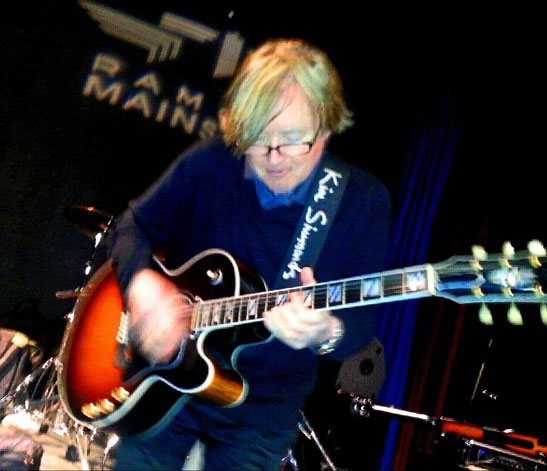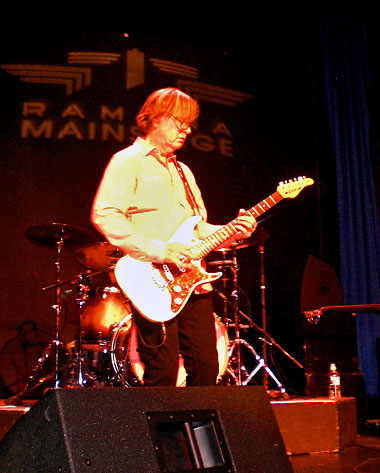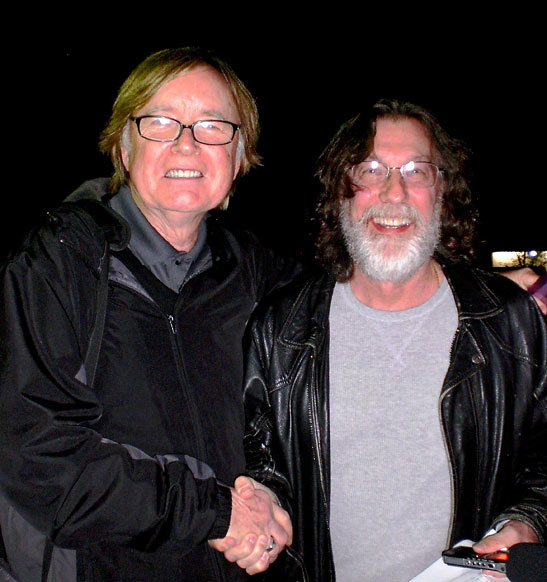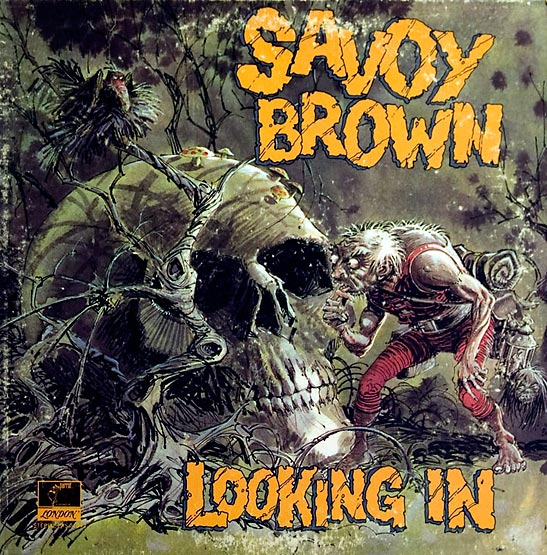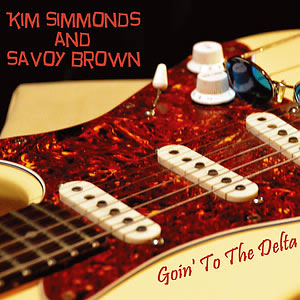 |
 |
|
 |

|
Savoy
Brown
Attempting to calculate the number of studio albums, 'live' material, and compilation releases since the bands inception creates what the Savoy Brown faithful call, 'A Hard Way to Go.' Most, including yours truly, lose track around the mid 30's. Kim thinks there may be more than that, but then shakes his head, 'Who knows?' This month the band drops their latest, 'Goin' to the Delta,' and the title alone gives you a good indication that Savoy Brown is getting back to its roots. Simmonds smiles, 'where the blues was born.' Prior to one of their recent Southern California shows, Kim talked about the road, the band, and his big brother's record collection. "Yeah, my brother (Harry) is seven years older than me. I was five or six years old and he'd be listening to Mario Lanza and Johnny Ray in the early 50's. Then Bill Haley, Rock and Roll hit in '53 and I would listen to the Rock and Roll records and he'd take me to the movies. And that continued on through my childhood. In the early 60's the family had moved to London and he'd take me to see the Rock and Roll shows and the blues shows. So when I was thirteen or fourteen I'd had this great upbringing and I started collecting records and going to the shows myself."
Influentially, Kim says a few blues players just naturally stood out. "Muddy Waters, I think. Muddy Waters… because he was at the top of the blues chain. He had been in Chicago and had the quintessential blues band, and then there was of course, John Lee Hooker, Lightnin' Hopkins. I always loved the solo blues guys, in the studio with the guitar and vocals… that always really struck my heart. And then there were the great guitar players; B.B. King, Freddie King and those kinds of guys. Howlin' Wolf was one of my favorites and Hubert Sumlin." Simmonds recalled, "On a very early diary I found on myself, Howlin' Wolf was one of my favorite artists and I got to see him when I was a kid in England when he toured with Hubert back in '63 or something…'64? And Jimmy Reed… on top of everything else, by the time I was 15 and I was able to go see the guys touring at the time." * * * * * * * * * * * * * * * "….the idea of an itinerant
blues singer singing on a corner * * * * * * * * * * * * * * * The conversation about early Delta players like Son House and Robert Johnson invariably turned north to Chicago. "I was never a big country blues guy. I did like a lot of country blues, I liked Arthur Crudup and people like that, who had affected (Elvis) Presley, you know? But it wasn't until later on that… I was a very hardened blues guy. I formed Savoy Brown to be a modern Chicago blues band. I was very much into modern sound and I wanted to be a part of what I felt was the future of blues… which was that singing guitar." For most baby boomers, Savoy Brown, Mayall's Bluesbreakers, the Stones, Cream, Zeppelin…all played a big part in re-introducing blues to America. "I think so, definitely. I mean that was a fact and a lot of the blues guys were aware of that when we first came over. All the interviews we would do for radio, we would say, these are our influences, this is where we got the music from… and I think all the great blues guys, Willie Dixon and people like that, appreciated the fact that their music was being recorded by a younger generation. But I think it all came to a head in '67 probably with the British blues boom. By the time Savoy Brown came along we were indebted to John Mayall, we were indebted to Eric Clapton, we were indebted to the Stones but when we came along we had a real authenticity that I don't think you'd quite heard before. So I think we contributed in our own way. History hasn't been kind to me or Savoy Brown because that fact sometimes gets lost because we never had the iconic success of some of the other acts. But the fact of the matter was in '67 we had a very, very authentic sound that hadn't been heard before." I'm smiling because here we are almost 50 years later, and I nod my head toward the front of the theater. There's a line of fans around the building waiting to get in for tonight's show… and Kim laughs, "Don't get me wrong, I'm not saying that in a bitter way. We had very hip records but we didn't get the No#1's and the No#5's." (chart hits). "People weren't following us around in that way… but to answer your question, of course I'm well aware of what we were doing for the blues and well aware of all that stuff and I'm very proud for the bit we did. But is Savoy Brown or Kim Simmonds… iconic musicians? Of course not!" As I continue to point with my head at the lengthening theater queue, Kim relinquishes somewhat, "The band and I have a very…as all of the fans know, have a very important part to play."
Skiffle was the pop music of Britain in the late 50's and early 60's, but there was a core group of blues players… Chris Barber, Cyril Davies and Alexis Korner… Kim quickly adds, "…and Long John Baldry! He was one of the first guys, Long John Baldry. I didn't know them, but of course I had the records. I had Alexis Korner's records; I was big fan of his… a big fan of Long John Baldry and Chris Barber, too." His eyes light up when recalls, "I saw Chris Barber backing up Sonny Boy Williamson; you know when he first came over. I was, of course, well aware of those people, and well aware of the Yardbirds, the Stones and the Animals, I'd see them play the clubs. So yeah, I knew exactly what was going on because I was there at the time, and luckily when I was 17, I did it myself." Truly a band of firsts, Savoy Brown broke racial barriers by being one of the first interracial groups to play in English clubs. "Yeah, absolutely… a black drummer and a black singer." But neither Simmonds, nor his mates registered on the significance. Kim is shaking his head, "We had no idea; they were just my friends in the neighborhood that I got together in the band." Historically, that was a fundamental difference between American and European attitudes at the time. "Yeah, socially it was completely different," Kim says. "I understand that. And I think it helped in a sense that when you're a thousand miles away the idea of an itinerant blues singer singing on a corner was somewhat romantic to us, because we were looking at it through a veil of thousands of miles. Whereas, if you lived in this country and there was someone on the corner singing and playing guitar you might have just walked by and there would be no romance involved in that. So I do think that the way we viewed it, was as fans. You know, with a touch of romance. And I think that's what we probably brought to things." Let's talk about a club in London called Kilroy's. "Oh yeah, that was John O'Leary and myself, we met at an import record store. I remember we started playing records together, he played some harp and I played guitar and we spoke about putting a band together. John knew of a pub that used to have a folk club upstairs that was defunct for many years. And he said it was a nice room, so we went and spoke to the owner and that's where I rehearsed the band, and that's where we opened up a club on Monday nights. We made up our own flyers and put them up around London. A few people showed up the first night and then it actually got to the point where, by the time we left, it became a regular venue." Some pretty impressive lineups took the stage at Kilroy's. "Freddie King played there," Kim says, "lots of people, Fleetwood Mac, everybody played there. And that's how it started. They had a small stage and I rehearsed the band there for quite a long time, two or three months. Sort of dress rehearsals for the actual opening of the club and that's what made the band, I think, so quickly be able to make a mark. We were rehearsing in real time for when we would be playing." Kim said it was about that same time that he met a guy named, Mike Vernon. "John and I asked my brother Harry, to manage us. And he got Mike Vernon to come down to see us. Mike liked us. We recorded for his Purdah label and cut a couple of singles. Mike became or was a producer at Decca Records. He produced John Mayall, and the second act he produced… was Savoy Brown. Mike was fabulous for the blues scene, he was one of the instrumental guys to get the whole thing going." The summer of 1966, Savoy Brown would open a gig at Klooks's Kleek R&B Club for a newly-formed, three-piece blues rock band. The new trio was called, Cream. "It might have been actually their first London date, I think. And my road manager, Brian Wilcox actually got the band on the gig as the opening act. It was a very small stage and a very small venue and Cream let us use their equipment because there was no room to take anything up. It just kind of shows you what a different world it is…" Take a second to think about that… on stage, at a venue where the Stones, Bowie and Hendrix play and you're using the other bands gear. And that other band is CREAM! Kim continues, "Of course I was scared stiff, you know what I mean? I was a kid. But we did well. John Mayall was there and he gave me some good advice. He said, 'Kim, you're playing everything in one key.' And I was playing everything in A with the band, you know. He said, 'You've gotta' change the key's up.' He's probably long since forgotten that. But that was my first bit of advice. Of course I'm a big John Mayall fan, and since then I've tried to change the keys up a little bit. Even now I play a lot in the key of A; it suits my voice actually, and some how or other the key of A rings for me in blues." Savoy Brown played another venue called the Metro with Champion Jack Dupree. "He was on the same agency as we were in '66," Kim said, "then we would end up being his backing band. We would go on and do our set, and he would come on and we would back him up. He lived in England for a long time and he was a great guy. I remember him giving me advice. We had played our show and were out watching other bands playing. And he was telling me the singers that would last and the singers that wouldn't last, because the singers that wouldn't last were the ones singing from their throat. And the singers that would last were singing from their stomach. And a lot of those blues guys were doing it all the right way. They were singing correctly, they were playing correctly. We look at them as folk artists, but in reality they were very sophisticated."
During a month-long tour, early in the bands history, one bluesman made a significant contribution to the music of Savoy Brown. That bluesman was John Lee Hooker. "Yeah, that was '67. It was incredible, of course. I was very young, 19 maybe. Some nights we'd only have one amplifier and he'd plug into one channel and I'd plug into the other channel and I'd stop when he was playing and he'd stop when I was playing. It was a blast. A major star… People like Brian Jones would come to the show so it was a heady experience to see some of these people and John was fantastic. I could never get as close to him as I would have liked because I'm inherently a little shy. And also I could never cross that line and think that John Lee Hooker could be, uh… that we could be friends? Which is crazy of me because he was a wonderful man and I could have done that. Actually, his guitar player told me once that John picked him up at the airport and he was playing a Savoy Brown CD. I think that's probably what kept John's career going for so long. He loved everybody and everybody loved him. He didn't close his ears to younger bands or other blues bands. He didn't say, 'oh, they're rubbish, they're English they can't play…' No! He actually embraced everything. It was fantastic." So that's where Savoy Brown got its 'boogie?' "Of course it was!!! It's John Lee Hooker all the way through. Everybody in the world is indebted to him for… what was it the late 40's when that first 'Boogie Chillen came out?' That just swept the whole U.S.A. and it never stopped. I was completely amazed with him that he could get on stage and play to any kind of audience… any audience. Whether it was a sophisticated club audience, whether it was an Army base or a private party, it didn't matter. He communicated with everybody. And it astonished me because I thought, 'well this certainly, this is music for surely a small select amount of people.' But no, his music crossed all boundaries." Blues seems to have that same capability. "I think if it's played well. If it's played well, it crosses all boundaries. But if it's played badly…like any music, people just turn away." Since the beginning Savoy Brown has been known almost as much for its personnel changes, as it has for its enduring music. "I think that initially, in those days especially, changing the band lineups was seen as a detriment." Simmonds explains. "We were always fighting, that aspect that I was changing the band all the time. And my brother and people behind the scenes were always 'cleaning up' and trying to put this together. But now when you look back, all the changes from the very beginning to now, are seen in a more positive light, because it produced such good music. I think one of the reasons is my personality… I'm always looking for challenges, I'm never happy to stay in one place; I'm always changing the music. I expect people to go along with it. If they don't go along with it I get a little… unhappy. It's just the fact that I love the challenge of re-inventing myself, all the time." And that's never changed? "It hasn't. It's still the same now. It's a challenge I take on. The past has always scared me, since I was 17 years old. But I'm not scared of the future at all." And when I'm older and wiser
Digging through the bands discography, it's truly amazing at just how productive Savoy Brown was in the late 60's and early 70's… Kim just smiles, "Well, it was a fantastic band." No one can argue that point, in the first 10 years, Savoy Brown released 13 albums. "Something crazy wasn't it? We did three in one year. Well, it was a fantastic, talented band. The front line was Chris (Youlden), Dave (Lonesome Dave Peverett) and myself, a very talented rhythm section and everybody working as a team. It was a very talented band, simple as that really." Simmonds along with drummer, Garnet Grimm and bassist, Pat DeSalvo have shown that although just a three-piece, the lineup today has a similar chemistry. The new album 'Goin' to the Delta' out this month explores more of Savoy Brown's roots. "Yeah," Kim said, "that was the idea of the song, 'Goin' to the Delta.' You're literally going back to those places where the blues was born and see what you can find." From the debut LP, 'Shakedown,' back when the band was known as the Savoy Brown Blues Band, Simmonds has always seemed intent on paying homage to his blues elders. Through the years that aim has yet to change. "Yeah, I'm still a fan." he admits. "Let's face it, everybody who goes before you are important and you're just hoping you can do your bit." The rewards were immediate on the band's final night in Southern California. The crowd responded to the new tracks enthusiastically and more often than not, while on their feet. "We all thought the material was good," Kim told me, "and we thought we made a good album, but you don't know? You start to get a little nervous because you think, 'what if it isn't any good?' But the first reactions to the album and on stage have been good. So after that we're starting to get a little confident. Hey, this might be a good one."
After all the years, the miles, the gigs, what are the blues to Kim Simmonds? "I think it's a melancholy sadness... soul. That's what blues is. I have a touch of melancholy in me and I think that comes out in my playing, if I'm playing good. So I think that's what it is. Its soul, you know? It's the old fashioned word. Soul is sadness and melancholy. You can actually be singing a happy song, but underneath when you see some of the blues people from yesterday, singing. They might be singing a happy song but you can see in their personality that there's still sadness within them. The blues, whether it's literally playing it sad or you're playing it happy, it's conveying something deeper. It's the soul within you." As Savoy Brown closes in on its 50 Year Anniversary…Kim reflected on a half century of music and finally acknowledged, "It's starting to affect me. Like everything else, you don't think it is, but when you reach the milestones… Even with you own age, you get to thirty, forty, fifty as you go up… these landmarks do affect you. And with this 50th coming up, it's really starting to affect me. I didn't expect that, I thought it would just be a year that would slip by…" If being 'affected' means continuing to tour, releasing new material and playing the classic hits like your hair's on fire, then personally, I can't wait to see how the next 50 turns out. Related Articles: |
|
|
This site is designed and maintained by WYNK Marketing. Send all technical issues to: support@wynkmarketing.com

|






